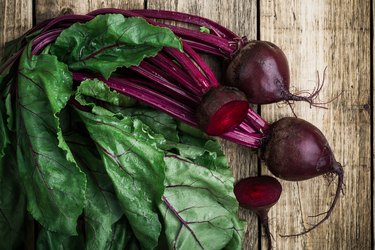
Your bowel movements suddenly changing to a very dark color can be, understandably, alarming. But a change to the color of your poop rarely indicates a serious health problem and it's likely caused by something you ate, the Seattle Children's Hospital Research Foundation states.
That is, it's possible a serving of beets, a snack of black licorice or some other food you noshed on that day could have caused a color change to your stools. Take a look at some supplements and foods that can potentially turn your poop dark.
Video of the Day
Video of the Day
1. Iron Supplements
Iron supplements can cause bowel movements to become dark, even black, according to the U.S. National Library of Medicine. If you are being treated for iron-deficiency anemia or are pregnant and taking prenatal vitamins that are high in iron, you may have darkened stools.
2. Antacid Medications
The medication bismuth subsalicylate (found in Pepto-Bismol and Kaopectate, among others), which is used to treat diarrhea, indigestion, heartburn and nausea, may turn your stool black, according to the Mayo Clinic. And in some people, these medications can lead to lighter white or clay-colored stools as well. These medications can also turn your tongue black!
Taking activated charcoal, which is sometimes used as a home remedy to treat heartburn, may also cause a dark stool, per the U.S. National Library of Medicine.
3. Colorful Foods
We're totally commending you for "eating the rainbow" — but don't be alarmed if your healthy habits show up in your stool.
Dark leafy greens can cause stools to be tinged with green pigment, according to the Mayo Clinic, while tomato products, beets, cranberries and grape juice may lead to a hue that ranges from bright red to almost black.
Black licorice, blueberries and dark chocolate cookies can darken stools to almost black. Artificial food coloring, common in drink mixes or ice pops, can tint your poop a range of colors, from red to green.
It Might Be Because You Have Diarrhea
If you are experiencing diarrhea, your stools may be greener than usual regardless of what you've been eating. That's because bile, a fluid your liver produces to digest fat, starts off a yellow-green color, according to the Mayo Clinic.
As bile travels through your digestive system, its pigments are chemically altered by enzymes and change from green to brown, which is why normal stools are generally brown. But when you have diarrhea, food is moving through your system so quickly that bile didn't have time to turn brown, resulting in green-tinted stools.
When to See a Doctor
While there are many foods that can cause dark stools, a change in color can also indicate an underlying medical condition, including a peptic ulcer, certain cancers and gastritis, according to the U.S. National Library of Medicine.
Stools that are brown, tan, yellow or green are normal — and people should only worry about stools that are black, red or white, notes the Seattle Children's Hospital Research Foundation. But stools that are red or black may be the result of bleeding in the gastrointestinal tract, according to the National Institute of Diabetes and Digestive and Kidney Disease.
"Black stool or bright red stool (in any amount — specks, streaks, etc.) should prompt medical attention," says Lindsey Albenberg, DO, spokesperson of the American Gastroenterological Association and an attending physician in the Division of Pediatric Gastroenterology, Hepatology and Nutrition at the Children's Hospital of Philadelphia.
Along with noting blood in your stool, other warning signs that merit a trip to the doctor include vomiting blood or feeling dizzy or lightheaded, according to the U.S. National Library of Medicine.
Read more: What Could Cause Loose, Dark Stools?
Is this an emergency? If you are experiencing serious medical symptoms, please see the National Library of Medicine’s list of signs you need emergency medical attention or call 911.